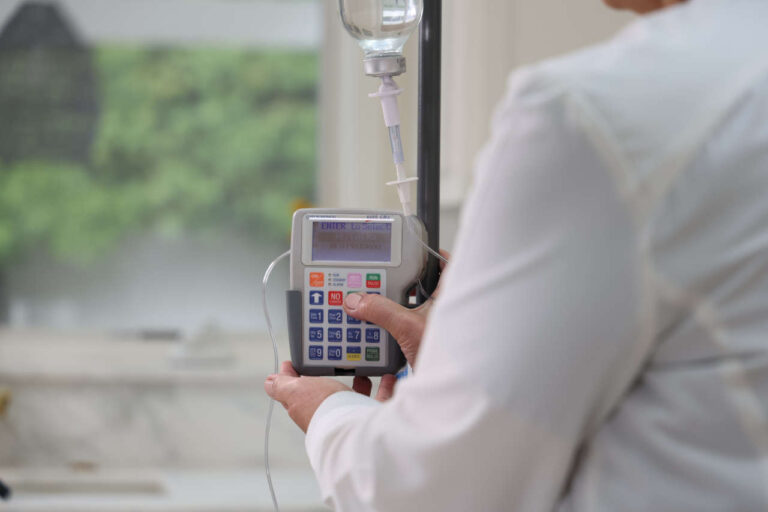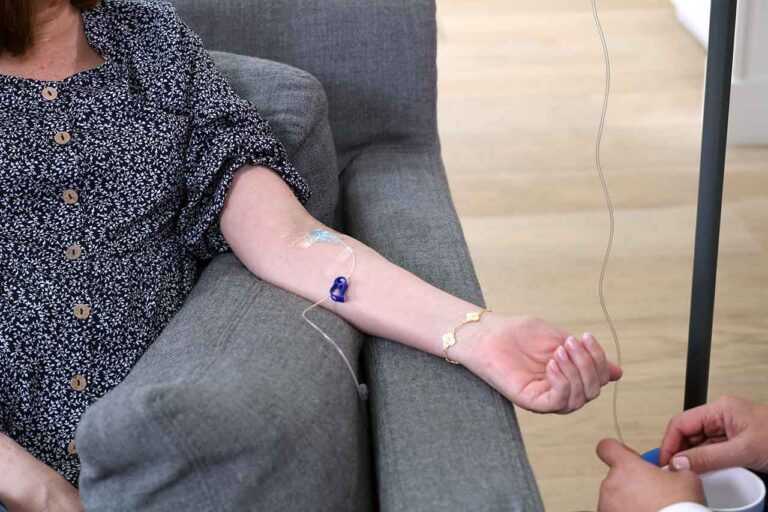
Immune checkpoint inhibitors (ICIs) are potent drug agents that stimulate long-lasting immune responses against cancer. ICI immunotherapy has revolutionized treatment procedures for cancer and now has become an effective option for patients with advanced or hard-to-treat (aggressive) cancers.
Խորհրդակցեք IVIG մասնագետի հետ
However, these anti-cancer agents can sometimes overstimulate the immune response and cause several adverse effects, also known as immune-related adverse events (irAEs) or immune checkpoint inhibitor-related toxicity. ICI-related toxicity can impact all organs, but the skin, digestive, and endocrine organs are more frequently affected.
If you or someone you know are experiencing severe-to-moderate immune checkpoint-related toxicity, then IVIG թերապիա can be considered to manage these toxicities (or irAEs). This article briefly explains what immune checkpoint inhibitors are, the toxicities they cause, and how IVIG can help manage them.
What Are Immune Checkpoint Inhibitors?
Normally, your immune system has immune checkpoints, which are the proteins that act like a brake to stop the immune cells from attacking normal healthy cells. However, some cancer cells can evade destruction by producing their own checkpoint proteins.
When a cancer cell’s checkpoint proteins bind to the T-cell’s checkpoint proteins, they turn off the T-cells — as a result, cancer cells continue to grow and spread.
Immune checkpoint inhibitors (ICIs) block these proteins on the T-cell and cancer cells. This turns on the T-cells and allows them to kill the cancer cells effectively.
What Is Immune-Checkpoint Inhibitor-Related Toxicity?
Though ICIs have successfully treated certain cancers like myeloma, kidney, or lung cancer, they can sometimes overstimulate the immune system, leading to immune checkpoint inhibitor-related toxicity or immune-related adverse events. The toxicity occurs early and typically happens weeks to 3 months after starting immune checkpoint blockers.
The type of ICIs you’ve received can affect and cause inflammation in any organ in the body. Some of the affected organs with side effects (toxicities) include:
- Skin (Dermatitis, seen in 40% to 60% of cases)
- Lungs (Pneumonitis, seen in 5% of cases)
- Endocrine system (Hypothyroidism, seen in 6% of cases)
- Gastrointestinal system (Severe colitis, seen in 2% to 7% of cases)
- Liver (Hepatitis, seen in 5% to 10% of cases)
- Neurological complications (Meningoencephalitis, միաստենիա գրավիս, and peripheral neuropathy, seen in 1% to 5% of cases)
Each patient responds to ICI immunotherapy differently. The toxicities of ICIs can vary among cancer patients and may range from mild to severely fatal. Therefore, a standard treatment is required to manage immune checkpoint inhibitor-related toxicity without completely shutting down its effect on fighting cancer.
How Is Immune Checkpoint Inhibitor-Related Toxicity Managed?
Healthcare providers treat immune checkpoint inhibitor-related toxicity depending on their severity. For instance, mild cases are usually managed with supportive care and careful monitoring. In most cases, corticosteroids (e.g., prednisone) are given to manage moderate to severe cases.
In some cases, when the patients do not respond to steroids, then immunosuppressive drugs like mycophenolate mofetil or infliximab are used in the treatment plan for these patients.
Խոսեք մասնագետի հետ
Copay օգնության մասինHow Can IVIG Manage Immune Checkpoint Inhibitor-Related Toxicity?
IVIG therapy can be used as an additional treatment in some severe cases of immune checkpoint inhibitor-related toxicity. For instance, one դեպքի զեկույց demonstrated that high-dose steroid therapy and IVIG treatment resolved immune checkpoint inhibitor-related toxicity in a non-small cell lung cancer patient who experienced esophagitis, gastritis, and myocarditis after taking ICIs (e.g., pembrolizumab).
IVIG modulates the overstimulated immune system in multiple ways:
It Neutralizes Autoantibodies
IVIG therapy neutralizes the autoantibodies that are produced by ICIs due to an overstimulated immune system. It counteracts the effects of these autoantibodies.
Այն նվազեցնում է բորբոքումը
Since IVIG has anti-inflammatory effects, it also helps to reduce inflammation caused by hyperactive immunological responses due to ICIs.
It Prevents Tissue Damage
IVIG prevents tissue damage by stopping additional immunological attacks.
In short, IVIG helps patients manage the harmful toxicities of immune checkpoint inhibitors (ICIs) while stabilizing the immune system. This allows patients to benefit from their cancer treatment with ICIs without affecting their immune response.
When Is IVIG Used for Immune Checkpoint Inhibitor-Related Toxicity?

IVIG is not a first-line treatment for immune checkpoint inhibitor-related toxicity and is only recommended under certain conditions:
- When կորտիկոստերոիդներ or other immunosuppressive drugs fail to manage immune checkpoint inhibitor-related toxicity
- When certain patients cannot tolerate high doses of steroids due to other illnesses
- As an immediate treatment, in some rare but severe cases, when corticosteroids are insufficient to manage ICI associated with Steven–Johnson syndrome (SJS) and toxic epidermal necrolysis (TEN)
Why Is IVIG Considered for Immune Checkpoint Inhibitor-Related Toxicity?
IVIG is considered for immune checkpoint inhibitor-related toxicity for two main reasons:
- First, IVIG has a rapid response, which means it works quickly and can manage severe or refractory ICI-related toxicities.
- Second, IVIG targets specific parts of the immune system and does not interfere with the effectiveness of ICIs, unlike other immunosuppressive drugs.
Ստացեք IVIG նախնական թույլտվություն
What Is the Standard Dose of IVIG for Immune Checkpoint Inhibitor-Related Toxicity?
The dose of IVIG can vary among patients and the type of toxicity they are experiencing. For instance, intravenous immunoglobulins can be given at a dose of 2 g/kg (0.4 g/kg/day over 5 days) to treat ICI-induced toxic epidermal necrolysis (a type of skin condition), pneumonitis (a type of lung condition), միաստենիա գրավիս, և ԳԲՍ.
Patients who received IVIG treatment showed significant improvement in their condition. However, IVIG can cause some կողմնակի ազդեցություններ, such as headache, fever, nausea, and allergic reactions.
Եզրակացություն
Though Immune checkpoint inhibitors (ICIs) are considered effective for treating aggressive cancers, they also cause toxicities (side effects) in some patients by overstimulating the immune system.
If you or your loved one are experiencing any unusual symptoms or ICI-associated toxicity, IVIG therapy may help manage these toxicities. IVIG does this by modulating the overactive immune system without disrupting the working mechanism of ICI in fighting cancer.
It is recommended to consult your healthcare provider to get a customized plan of IVIG according to your ICI-related toxicity.
Հղումներ՝
- Durrechou, Q., Domblides, C., Sionneau, B., Lefort, F., Quivy, A., Ravaud, A., Gross-Goupil, M., & Daste, A. (2020). Management of Immune Checkpoint Inhibitor Toxicities. Cancer Management and Research, 12, 9139. https://doi.org/10.2147/CMAR.S218756
- Conroy, M., & Naidoo, J. (2022). Immune-related adverse events and the balancing act of immunotherapy. Nature Communications, 13(1), 1-4. https://doi.org/10.1038/s41467-022-27960-2
- Kian, W., Zemel, M., Elobra, F., Sharb, A. A., Levitas, D., Assabag, Y., Alguayn, F., Yakobson, A., Rouvinov, K., & Fuchs, L. (2021). Intravenous immunoglobulin efficacy on pembrolizumab induced severe toxic epidermal necrolysis. Anti-Cancer Drugs, 33(1), e738. https://doi.org/10.1097/CAD.0000000000001162
- Haanen, J., Carbonnel, F., Robert, C., Kerr, K., Peters, S., Larkin, J., & Jordan, K. (2017). Management of toxicities from immunotherapy: ESMO Clinical Practice Guidelines for diagnosis, treatment and follow-up. Ուռուցքաբանության տարեգրքեր, 28, iv119-iv142. https://doi.org/10.1093/annonc/mdx225
- Sullivan, R. J., & Weber, J. S. (2022). Immune-related toxicities of checkpoint inhibitors: Mechanisms and mitigation strategies. Nature Reviews Drug Discovery, 21(7), 495-508. https://doi.org/10.1038/s41573-021-00259-5
- Thompson, J. A., Schneider, B. J., Brahmer, J., Achufusi, A., Armand, P., Berkenstock, M. K., Bhatia, S., Budde, L. E., Chokshi, S., Davies, M., Elshoury, A., Gesthalter, Y., Hegde, A., Jain, M., Kaffenberger, B. H., Lechner, M. G., Li, T., Marr, A., McGettigan, S., . . . Hang, L. (2022). Management of Immunotherapy-Related Toxicities, Version 1.2022, NCCN Clinical Practice Guidelines in Oncology. Journal of the National Comprehensive Cancer Network, 20(4), 387–405. https://doi.org/10.6004/jnccn.2022.0020
- Haugh, A. M., Probasco, J. C., & Johnson, D. B. (2020). Neurologic complications of immune checkpoint inhibitors. Expert Opinion on Drug Safety, 19(4), 479–488. https://doi.org/10.1080/14740338.2020.1738382
- Marin-Acevedo, J. A., Chirila, R. M., & Dronca, R. S. (2019). Immune checkpoint inhibitor toxicities. Mayo Clinic Proceedings, 94(7), 1321–1329. https://doi.org/10.1016/j.mayocp.2019.03.01













